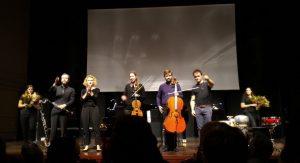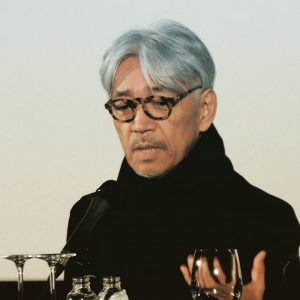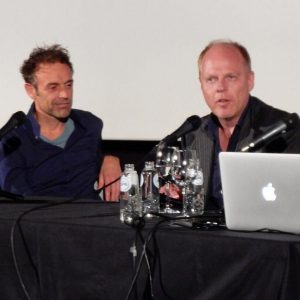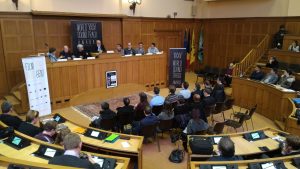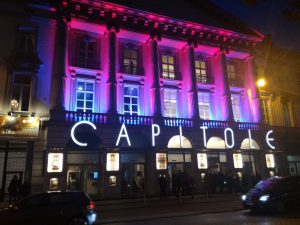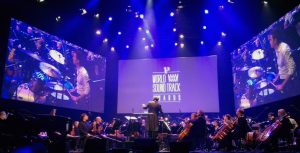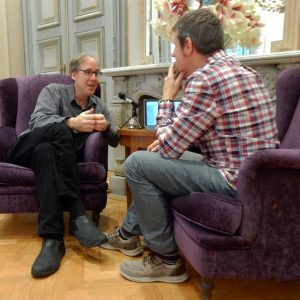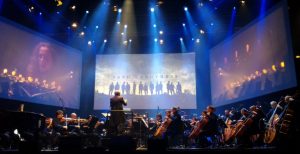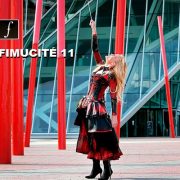World Soundtrack Awards 2016 – Festival summary
It’s time to recap and make balance of the World Soundtrack Awards 2016 (WSA) festival, held in Ghent (Belgium) on 19th and 20th of October, although it had additional events on the 17th and 18th. The WSA took place within the Film Fest Gent, its big brother, celebrated from 11th to 21st of October.
My intention with this article is to write a review as complete as possible, to give an idea of how the festival was for those couldn’t attend, and who may have doubts about attending future editions.
Therefore, although last year it was my first time in the WSA and I only spent a couple of days, this time I planned my trip with more time, to be there during the 4 main days of the festival.
DAY 1 – MONDAY 10/17/16 - INDUSTRY DAY & GOSSES DE TOKYO CONCERT
The first day of the World Soundtrack Awards began intensely, with a day fully dedicated to panels and lectures on relevant aspects of the film music industry, that under the name of Industry day, talked about many interesting topics such as the European proposal on copyright law, the role of music supervisors, or collaboration between composer of a TV series and the creative team.
Unfortunately in my case (as in many others), Monday was a day for travel, a day for transition, so when I got to Ghent the conferences were already over. I think it’s not a good idea to put the Industry day as the first day of the festival, as this leads to many absences, although I’ll talk about this more in detail at the end of the article in the summary section.
At night, at 8 pm, I attended an event that initially was not on my agenda, but that got my attention, the screening of a Japanese silent film from 1932 in black and white, Gosses de Tokyo (translated into English as “I Was Born, But …”) by director Yasujiro Ozu, that had music performed live.
With a soundtrack composed by the Belgian Gwenaël Grisi, which had been commissioned by the Ars Musica festival together with the Film Fest Gent, you could see five musicians on stage; piano, cello, clarinet, percussion and violin / viola, that played the newly composed soundtrack live to the film.
I have to say that both the film and the music pleasantly surprised me. To be a silent film from the 30s, I expected it to be more exaggerated in its realization and overacted, but I found a flawless direction, with very descriptive and well linked camera shots, and performances that conveyed very well the two sides of the story of the family, both comic and dramatic, resulting in a highly recommended movie.
Music supported perfectly the storytelling, and also helped the movie providing sometimes sound effects (interesting the use of steel drums of the percussion section), resulting in a fresh, expressive and very descriptive composition.
A successful event, which rescued a fabulous movie, and added a lively and high-quality soundtrack, which provided very interesting details to the images.
DAY 2 – TUESDAY 10/18/16 - FILM MUSIC SEMINAR
The second day, the highlight was the Film Music Seminar, to be held in the Kinepolis cinemas, from 9:30am to 4:30pm, lunch break included, and which could be accessed buying a ticket for 20 €.
This event was divided into several panels/conferences, where composers, under the moderation of the researcher and music doctor Martine Huvenne, talked about their work and commented the videos shown on the screen, leading at the end of each conference to a Q&A session with the audience.
The first panel was with composers Jeff Beal and Jeff Russo, who commented their beginnings and their careers as musicians before turning to composing for film and TV, and talked about some of their major works; the film Pollock and TV series House of Cards in the case of Jeff Beal and TV series Fargo in the case of Jeff Russo.
One idea I found very interesting was what Jeff Russo said when he was asked about the approach to get the musical guidelines in a project: “Movies are the director’s vision, while a TV series is the vision of a writer, so the people you have to deal with, changes“.
Later, it was time for the break and lunch in an annex room to the cinema, where you could chat with other seminar attendees (mostly students and/or aspiring composers or directors), and also the main composers from the panels were there, accessible to any questions or conversations.
After the break, it was the turn of Ryuichi Sakamoto’s conference, the main guest of the festival, who arrived slightly late, and had a 1 hour conference, talking first about his job in Merry Christmas Mr Lawrence. In that project, he was an inexperienced film composer and he was terrified of facing such an important task, but it all went very well and he also took part as an actor in the film. Half joking and half serious, he said that he tried to compensate for his poor acting in the film, filling everything he could not express as an actor with music.
Then he talked about his collaboration with Bernardo Bertolucci, mainly in The Last Emperor, and how he was called to play a role in the film, which then change substantially as the script was modified. When the film was almost finished and he had done his work as an actor, he received a call from Bertolucci asking to compose the music… giving him only 1 week!
So, he turned down all his commitments for the next 6 months and began to compose, bringing a week later some demos recorded with real musicians to Bertolucci, where the director dismissed almost 50%. He also commented that curiously almost all the music with oriental style in the film is from David Byrne, while the music having more western style is his, although people tend to think otherwise.
A very interesting talk, where after the Q&A from the audience, Sakamoto left the room in applause and in a hurry to get to his next appointment, giving way to the last conference of the day with Danish composer Karsten Fundal and director Johan Grimonprez.
Throughout the seminar, you could see other guest composers of the festival in the venue, such as Mac Quayle or Ben Lovett, who attended the conferences as public.
DAY 3 – WEDNESDAY 10/19/16 - MEET & GREET and WSA GALA CONCERT
Wednesday came and the main day of the festival arrived, with a session of Meet & Greet in the morning, to have the gala-concert with the awards ceremony at night.
The Meet & Greet was preceded by a press conference, which was accessible only by invitation, although it was possible to request a pass by mail to the organization, and thus there were several people that attended even not being press.
The press conference with the main guests was held at the town hall, in the plenary hall, a noble place, which gave the feeling of being in a parliament or a senate, or as someone humorously said, in court judging the composers for their sins.
At the press conference we could see Daniel Pemberton, John Lunn, Ryuichi Sakamoto, Dirk Brosse, Jeff Beal, Sean Callery and Jeff Russo with the absence of Alex Heffes, who had been announced but could not attend. Among the public, another good batch of composers like Mathew Margeson, Mac Quayle, Nicholas Britell or Ben Lovett (candidates in some of the categories of the awards of that night).
With the festival’s artistic director Patrick Duynslaegher moderating the press conference and making the first questions to establish a small debate, time of questions from the people in the room came, and since I had been unable to get an interview with Ryuichi Sakamoto due to his busy schedule, I took the opportunity to launch a question that had not been talked about in his panel the previous day.
My question was more a curiosity for his work in the film High Heels, with the renowned Spanish director Pedro Almodóvar. Sakamoto said he received a call from the office of Pedro Almodóvar, saying he was wanted for the music in his next film, so he took a plane to Madrid and met there with the director. They had dinner and then talked about the project, and kept talking all night non-sleep. Sakamoto, who was still Jet Lagged, did not realize about the time, but when daylight came, he was astonished and thought “wow, these Spanish people are strange, and do not sleep”, and Almodóvar replied that creativity doesn’t have schedules.
After that initial conversation, Sakamoto was interested in the project and accepted it, and said he had absolute freedom to compose the music he wanted and give it the approach he deemed necessary. The only guideline that Almodóvar gave was that music needed to have a touch of Spanish essence, without falling into cliché, but had to match that essence that appeared in the film. From the music he initially composed, approximately 60% was accepted and incorporated into the film and the rest either had to be changed or did not reach the final cut, which Sakamoto said is quite common.
Once Q&A was finished, the press conference ended and a signing session with the guests started, making a queue with the few people who were in the room, which was dispatched quite fast.
And so the morning was over and gave way to the main event of the World Soundtrack Awards, the evening gala concert.
The place for its celebration was changed from last year, being now the Capitole Ghent, a theater with a capacity for 1900 people, instead of Kuipke Ghent, a velodrome with a capacity for 3,000 people (although not all the seats were used, due to the space occupied by the stage at the velodrome).
The night started slightly passing 8 pm with the World Soundtrack Awards Fanfare (Elmer Bernstein) and the Sabam Award for the most original composition by a young international composer. Here, three works were selected from a total of 73 participants, scoring the credits of the television series The Saint.
Three very interesting compositions, with some similar points but with fresh and original ideas, where Turkish composer Sándor Török, won a 2,500€ prize for his work.
Later, the awards ceremony of the rest of the categories was held, where Carter Burwell received three awards (2 selected by the jury and one chosen by the public), who was not in the room to receive them, so he sent one gratitude video message after another. Funny messages saying how sorry he was he could not be in person in Ghent, each message funnier than the previous one.
This was the complete list of winners announced at the gala:
I’d like to highlight that at the end of the awards ceremony, where Ryuichi Sakamoto was presented on stage the Lifetime Achievement Award by his colleague and collaborator Alva Noto, he gave a speech that ended saying “Music is very important in movies, yet the composer often arrives at the end of the process, with no time to compose. Please give more time to composers, more room for creativity and more money! “. A brave and interesting end of speech, which drew a big applause in the theatre.
Following, and after almost 50 minutes from the start of the gala, the part of the concert dedicated to the music of Ryuichi Sakamoto began, and it did with the piece The Last Emperor (1987) – Endroll, involving 3 musicians with traditional Chinese instruments on stage, to go later to High Heels (1991) – Main Theme and then continue with Femme Fatale (2002) – Déjà Vu II, which turned frankly boring, both musically and visually, and broke the pace of the previous two pieces.
Then Ryuichi Sakamoto went on stage with an applause from the audience, and played the piano along with the Brussels Philharmonic Orchestra conducted by maestro Dirk Brossé the piece Merry Christmas Mr Lawrence (1983) – Main Theme, where the camera showed the hands of the composer on screen at first, but then diverted the attention to the orchestra more than necessary, when the prominence should have been in the main guest.
And so, when there was just over an hour of concert, a 20 minutes intermission came, to continue the evening at 9:45 pm.
The second part of the concert was dedicated to TV music, starting with Doctor Who – I am the Doctor (Murray Gold) that was the first moment of the night when the fabulous Flemish Radio Choir joined, to then give way to the White Queen – Suite (John Lunn), who was in the room and received a big applause.
Next, a soloist came on stage to sing Roots – Suite (Alex Heffes), who gave a wonderful performance, especially at the end of the piece that was very powerful and very well received by the audience.
And then one of the best moments of the night came, in my opinion, as award winner Jeff Beal, took the stage with 2 different trumpets to accompany the orchestra in the performance of House of Cards – Suite (Jeff Beal).
The first part of the suite corresponded to the main title, and there he used the first trumpet, more solemn and with louder sound, to switch later to the second trumpet with a warmer sound when the suite led to a delicate moment of the series, which involved the death of a person loved by the main characters. A wonderful suite with a masterful performance by Jeff Beal on the trumpet, playing with tones and notes, and making the trumpet weep in an incredible way, as I don’t remember from any other another concert.
The next piece was Parade’s End – Reunited & Song for Peace (Dirk Brossé), where a soprano dressed in red made an appearance to accompany the orchestra, giving way to two pieces of Upstairs Downstairs – 165 Eaton Place & Lotte Sent Away (Daniel Pemberton), which were really well performed and where the composer stood and received applause from the audience.
Following, Mad Med – Suite (David Carbonara) was played and then Jeff Russo went on stage to be in charge of the drums for Fargo – Main Theme & Peggy Watches TV & Rye’s Theme (Jeff Russo), who did a very interesting and very good rhythmic performance.
The next part was for me the best moment of the night, and almost I’d say that the best of the festival, because to play Homeland – Suite (Sean Callery), we had a luxury cast; Sean Callery on Piano, Jeff Beal on trumpet, Jeff Russo on drums, Benoît Grey on bass, and electric guitar accompaniment from the orchestra. With rest of the orchestra in silence, and with Sean Callery conducting and marking the entrances to their peers with the piano, Jeff Russo was splendid on drums, providing rhythm and warmth alternately, while Jeff Beal demonstrated again his trumpet mastery at will, with the torn and heartfelt notes that evoke the thoughts of the protagonist of the series. A luxury suite with a stellar cast, which was worth for the whole night!
Addressing the end of the concert, the orchestra with the participation of the choir played the piece The Leftovers – Concert Medley (Max Richter) that had a very powerful and strong performance, ending the night with Sherlock – Suite (David Arnold & Michael Price), in an agile and well-structured suite.
At the end, the World Soundtrack Awards Fanfare (Elmer Bernstein) was played again, with no option to any encore, as all the composers and soloists went on stage to receive flower bouquets. And so, the evening ended almost 3 hours after it began.
A concert that had a very good second half, but had a first part somewhat weak, both for the awards that slowed down the rhythm of the night, and for the music chosen that failed to excite the audience.
DAY 4 – THURSDAY 10/20/16 - WSA CONCERT
In the morning, it was time to get some rest after three intense days of festival, but I also took the opportunity to conduct interviews with some guests, that I hope to publish soon in SoundTrackFest.
And then the moment for the WSA concert arrived at 8 pm, having this time a full house in Capitole Ghent (in fact, the tickets were sold out long ago, something that had not happened the day before, despite having more guests in the room because of the gala).
Before talking about the concert, let me tell you that this day I was located in a row near the stage (row 7 vs. row 19 yesterday), and the truth is that the difference was huge. There was a better view of the stage, which had 3 huge screens mounted on it (one central and two diagonally adjacent to this) and the absence of plasma screens on the sides of the theater, that were present in row 19 and on, was much appreciated (these screens, were showing close -ups of the orchestra during the performance, but suddenly illuminated the darkness of the theatre in many occasions, resulting quite annoying because of the light changes).
The concert started with a first part dedicated to old TV series, being the first piece a suite of several television series by Jerry Goldsmith (The Man From Uncle, Dr. Kildare, The Waltons and Barnaby Jones) putting the retro tone to the evening, while images and videos of the series were projected on the central screen (the side screens were reserved to follow the musicians of the orchestra and the conductor).
Later Dinasty (1981) – Main Theme (Bill Conty), Star Trek (1966) – Theme (Alexander Courage) with soprano, Mission Impossible (1966) – Main Theme (Lalo Schifrin) and Hawai Five-O (1968) – Theme (Morton Stevens) were played, and this was when the mastery of the orchestra under the skillful and precise baton of Dirk Brossé could be felt.
In the next piece, rarely heard in concert, the choir supported the interpretation of Moses (1974) – Theme (Ennio Morricone) which was very well received, and gave way to a moment of color and fun with The Simpsons (1989) – Theme (Danny Elfman).
Then the hypnotic and fabulous music of Twin Peaks (1990) – Main Theme (Angelo Badalamenti) filled the room, giving turn to the interesting and well performed Wild Palms (1993) – Main Theme (Ryuichi Sakamoto), this time without the presence of the composer in the theatre.
When it seemed it was time for intermission, the show continued relentlessly with Band of Brothers (2001) – Main Theme (Michael Kamen), with an amazing choir that appeared behind the two side screens of the stage, managing to deliver goosebumps while videos and images were projected on the central screen, recalling the epic moments of this fantastic series.
And from now on, we entered what could be called the second part of the concert, because the program was going to be very similar to the one of the previous day, but with some slight omissions.
First Mad Med – Suite (David Carbonara) was performed and then Jeff Russo went on stage to play drums for Fargo – Main Theme & Watches TV & Rye Peggy’s Theme (Jeff Russo).
And due to the success of the previous day, an extra happened out of the program, where Sean Callery, Jeff Beal, Jeff Russo and Benoît Grey took the stage again to play Homeland – Suite (Sean Callery), which was once more the biggest moment of the concert, and that due to the jazzy nature of the piece, had slight and great variations from what we heard yesterday. Awesome!
Then Parade’s End – Reunited & Song for Peace (Dirk Brossé) with soprano was performed and following Roots – Suite (Alex Heffes) with soloist like the day before, giving way later to Jeff Beal with House of Cards – Suite (Jeff Beal), again with a wonderful interpretation.
The night ended with The Leftovers – Concert Medley (Max Richter) and Sherlock – Suite (David Arnold & Michael Price).
And so, with a little less than 2 hours from the beginning, this fantastic evening ended. In conclusion, I would say that this second concert was better than Wednesday’s gala-concert, as the first part brought a touch of nostalgia and the possibility of rescuing music from TV series that are not frequently performed, and the second part contributed with the best of Wednesday’s concert.
IN SUMMARY
To finish this lengthy article, it is time to make balance, review the strengths and areas for improvement of the festival, and contribute with ideas and suggestions in a positive way.
Points for improvement:
Dates. The dates of the concerts, Wednesday for the gala-concert and Thursday for the second concert have been unfortunate, falling on working weekdays. In addition, the fact that the Industry day has been celebrated a Monday, the first day of the festival when many people were still in transit, has led to many absences. It is clear that the dates of the WSA are marked by the Film Fest Gent, but within the possibilities, the WSA should try to “push” the dates a little more towards the weekend, both delaying them or coming earlier, and also should try to relocate the Industry day to a better date.
Accessibility. Ryuichi Sakamoto has been inaccessible most of the time during the festival for the general public and for his fans. He has fulfilled his schedule and agenda, but had not contact beyond what was strictly necessary. Other European festivals with important guests (recent examples of Howard Shore in Fimucité or Alexandre Desplat in Hollywood in Vienna), are more permeable to such contacts, but that didn’t happen here, where the barrier is very strong. I think this is a point that should be improved and made more flexible, to generate closeness and empathy in the audience, and not to give a feeling of elitism.
Fans. I have missed the fans of film / TV music. As an example, the day of the Film Music Seminar, at the end of the panel offered by Jeff Beal and Jeff Russo, two renowned composers that many people who go to festivals like this should be willing to meet, and having an audience of more than 120 people in the cinema, less than 5 people came to the composers for some small talk, taking a picture or asking for a signature.
In fact, during the lunch break, in which composers shared space with conference attendees (which was a good idea), almost no one approached them to talk about their work or engage in a conversation.
It seems that the WSA festival is oriented to the general public, without a particular attraction to fans of film/TV music. With a little effort I think this could be improved, providing more opportunities for that kind of public, who would function as ambassadors of the festival or of the composers, and result in better advertising for the event.
Big brother. Film Fest Gent is the main event, and the World Soundtrack Awards is part of it. The feeling of being under the shadow of the film festival is very large, and in fact, the schedule and dates of this year have been due to organizational needs of the “big brother”, reducing attendance to the WSA. Scheduling concerts in Wednesday and Thursday is a very bad option for audience coming from abroad.
Absences. Alex Heffes and Max Richter were announced to be attending in person some festival events, but in the end they did not come. It would have been a good idea to confirm their absence officially, so that people would not wait until the last day to see if they could really appear.
Guests. The overall number of composers in Ghent has been greater than the number of composers who participated in the seminar or in the meetings. Thus, a panel or an additional chat with them has been missed, for example with several of the nominees present such as Mathew Margeson, Mac Quayle, Nicholas Britell or Ben Lovett, that surely had many interesting things to say, and were in the festival but didn’t have the chance.
Strengths:
Organization. The organization of the festival is excellent with all the events perfectly planned and coordinated, and timings and schedules are strictly fulfilled. A very large team of professionals and volunteers managing the WSA, very well prepared, working in collaboration with the staff of Film Fest Gent.
Location. The change of the concert venue from last year’s Kuipke Ghent velodrome, to Capitole Ghent theater has been a success, as the warmth of the place and the acoustics, are much better and lead to a greater enjoyment of the concerts.
In addition, the fact that most events (concerts, meet & greet, seminar), are held at a close distance from each other, with the ability to walk within the urban core of the city of Ghent, is something to thank.
Program. The concert program on Thursday was excellent, with the opportunity to listen to TV classics that can hardly be enjoyed in concert. Also the movie “Gosses de Tokyo” was a great surprise, something like finding a pearl inside an oyster. Rescuing old and high-quality pieces, that are hardly interpreted in concert is very interesting, and it could and should be one of the premises that mark the festival’s program in future editions.
Composers. Having several of the composers on stage performing their own pieces has been wonderful and has resulted in priceless moments, such as Jeff Beal with his House of Cards or the whole band (affectionately called “Sean & The Two Jeffs“), playing Homeland. It is a luxury that can be seen in few festivals, and I hope it can be repeated in future editions, as it has added an extra to the concerts, generating a sense of complicity with the public that’s been very positive.



